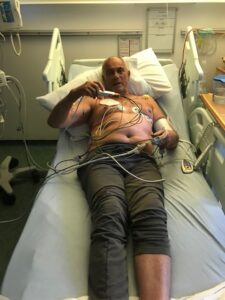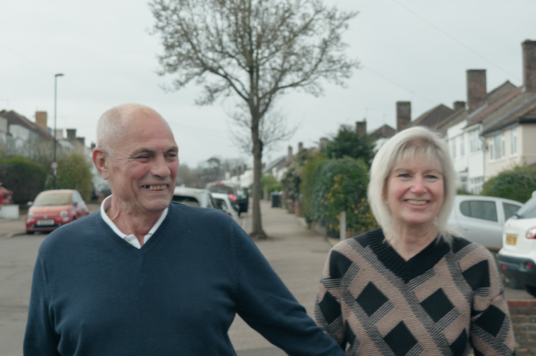St George’s first in the UK to give ‘chemotherapy’-style dosage for heart failure
A pioneering new way of treating heart failure more aggressively has cut deaths by nearly two-thirds, bringing hope to patients and families affected by the deadly condition.
St George’s Hospital treated the UK’s very first patient in a new way – inspired by the results of a global trial, STRONG-HF, which was stopped early because it was so successful. It is now one of the first hospitals in England to roll a programme out to more people.
Patients with the condition – which happens when the heart is unable to pump blood properly around the body – are typically started on smaller amounts of drugs to help improve heart function, with doses increased over several months.
Now, however, eligible patients at St George’s – home to the UK’s only dedicated specialist heart failure unit – will receive “optimal” doses of medicines – made possible by frequent monitoring and testing, with strong evidence from the clinical trial.
It means some patients will ramp up treatment much more quickly, as an optimal dose of medicine is the amount that gives the best balance between effectiveness and safety – or taking enough of the medicine to treat the condition without causing harmful side effects.

As well as drastically reducing deaths by 62%, it boosts quality of life and even eases pressures on other NHS services including emergency departments, by slashing hospital readmittance rates by 30% and reducing the number of appointments.
Matthew Sunter, Lead Heart Failure Nurse at St George’s, said:
“Heart failure kills as many people as cancer, yet cancer treatments such as chemotherapy start faster. Now, armed with our new knowledge, we’re able to replicate this with heart failure patients, starting them on higher doses of medicines and increasing them much more quickly – in around three weeks, as opposed to several months.
“I’ve been in this role 10 years, and when I started I never imagined we could treat patients in this manner. We’ve come a really long way, and I’m so proud of the work we’ve been doing at St George’s.”
Nicola Shopland, Chief Nurse at St George’s, said:
“Heart failure is a serious condition that can seriously impact a person’s life – and, in worst cases, prove fatal.
“We run the only dedicated specialist heart failure unit in the country, and now we’re building on this success by adopting a new way of treating patients that will save many lives.”
Up to 100 patients a year at St George’s are expected to be enrolled – with 12 people already having been treated under this new model.
Among them is Selsdon resident Paul Curtis, who was the first patient in the UK – and at St George’s – to receive treatment through the programme.
The 71-year-old retired builder had a heart attack in July last year, and was later diagnosed with acute heart failure – but has now been discharged by the service after undergoing treatment.

“I’m feeling very well and my life is back to how it was before I was diagnosed,” said Paul, who is married to Dawn. “I went away to the Canary Islands at Christmas, and we’re going to Rhodes later this year to see my nephew get married. We’ve been going out for meals again with friends, and I’m able to do things around the house, like washing the car and mowing the lawn.
“Matt and the whole team at St George’s have been brilliant, and I’ve put my trust in them throughout the whole process. We also have a direct line to Matt that we can ring if we have any concerns, which from what I’ve heard is unusual. We’ve found it really helpful and it provides that additional reassurance for us.”
The new programme will be delivered in partnership with Roche Diagnostics, which provides a blood test that checks for signals given off by the heart to see if it is under stress or dysfunctioning. This enables higher doses of treatments to be delivered safely.
Katherine Booth, Clinical Market Manager – Cardiac for Roche Diagnostics UK&I, said:
“We know this small but significant change to the management of acute heart failure could improve the lives of many patients.
“We’re delighted to be working with St George’s on introducing this improvement, and we hope to partner with more NHS organisations to ensure even more patients can benefit from it.”


